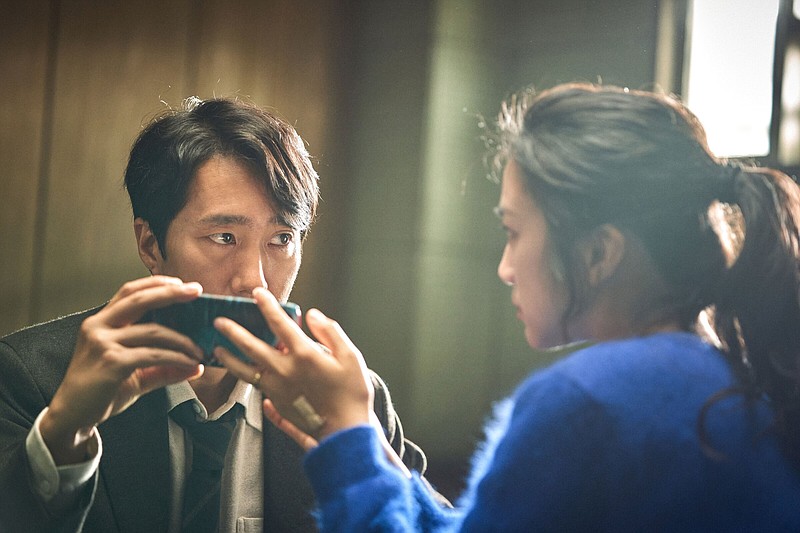South Korean auteur Park Chan-wook is a very distinct filmmaker, yet he's one who is impossible to put into a box. He has certain signatures fans will often look for. For example, he's well known for his use of extreme violence, and it's often fused with pitch-black humor. His subject matter and themes can be notoriously bleak and brutal. And his characters are often defined by their complexities and usually driven by some form of revenge.
But for every "Oldboy" there is something dramatically different like "Joint Security Area" or "Stoker" (a vastly underrated 2013 English-language thriller). Now the 59-year-old Park is back with "Decision to Leave," his first feature film since 2016's "The Handmaiden." It's coming off a terrific festival run with Park winning Best Director at Cannes. Better yet, this very well may be his best film to date.
Park's fans will notice the filmmaker's fingerprints all over "Decision to Leave," from his treatment of characters to his sheer technical savvy. His story (which he co-wrote with Chung Seo-Kyung) revolves around two emotionally intricate people and their complicated relationship that uncoils over the movie's 139 minutes. It's not always clear where Park is going. But a big part of the movie's allure is trying to piece together its knotty human puzzle while navigating the shifting emotions and shaky morality. It's made even better with Park's precision and DP Kim Ji-yong's arresting visual language as our guide.
Among the many joys of watching "Decision to Leave" is taking in Park's use of genre. Early on his film plays like a Hitchcockian crime noir, complete with a hardboiled detective and a seductive femme fatale. Later it evolves into a simmering psychological romance -- one that makes for an exquisite examination of obsession and the many forms it can take. Along the way we get pinches of dark humor that often come in the most unexpected moments. But it's also a movie with a steady ache and full of longing. It all comes together into one spellbinding web that constantly has us questioning what we're being shown.
Hae-joon (Park Hae-il) is a Busan homicide detective who's dedicated to his work at the expense of his marriage. He and his wife of 16 years, Jeong-ahn (Lee Jung-hyun) have a stable relationship and a comfortable life. But their marriage has lost its spark. Hae-joon spends weekdays in the city close to his work, only coming home on weekends. There is no noticeable tension or hard feelings. They're simply a couple who have grown apart, and they don't know what to do about it.
Rather than finding fulfillment in his marriage, Hae-joon finds it in his work. So, naturally, he's quick to jump on a new murder case. He's sent to investigate the death of a mountain climber who plummeted from the top of a tall, oddly flat-topped mountain peak. After examining the scene, Hae-joon pays a visit to the deceased's beautiful Chinese-speaking wife, Seo-rae (an absolutely magnetic Tang Wei). She doesn't come across as mournful or even surprised by her husband's death which immediately pique's Hae-joon's curiosity.
Over time, that curiosity slowly evolves into an unhealthy obsession. Hae-joon begins staking out Seo-rae's home and following her to work where she's a caretaker for the elderly (make note of that -- there are no wasted details in a Park Chan-wook film). Soon he's bringing her into the police station for dinner over "questioning." The deeper we get into the story, the more infatuated Hae-joon gets. He begins using his detective status as a means of satisfying that infatuation. Never mind that he's supposed to be determining whether Seo-rae shoved her husband off the mountain ledge.
Most interesting is that Seo-rae is perfectly aware of Hae-joon's evolving feelings for her, and she's not above using them to her advantage. Yet over time she too shows a growing affection. How deep are her feelings? Despite the simmer between them, it's always hard to tell. Seo-rae is a beguiling mystery, and much of what makes Tang Wei's performance so great is her ability to keep so much hidden. One minute she has us convinced Seo-rae is crooked and playing Hae-joon like a fiddle. But then she'll catch us off guard with an unexpected line. Sometimes it's a simple look. Tang Wei keeps us asking the question -- is this a psychological chess match or is it a forbidden love story? Maybe a little bit of both.
Park keeps us guessing throughout. Even later on when it appears everything is taking form, he broadsides us with another jolt -- one that eases the film toward a powerful and heart-rending conclusion. It's an ending perfectly tuned for a movie so full of melancholy and longing. And the final few minutes offer yet another example of Park's impeccable control of his characters and also his audience.
